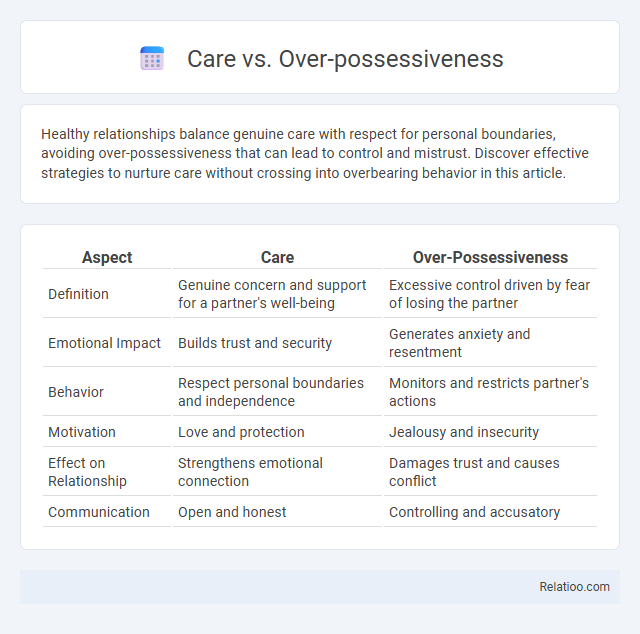Healthy relationships balance genuine care with respect for personal boundaries, avoiding over-possessiveness that can lead to control and mistrust. Discover effective strategies to nurture care without crossing into overbearing behavior in this article.
Table of Comparison
| Aspect | Care | Over-Possessiveness |
|---|---|---|
| Definition | Genuine concern and support for a partner's well-being | Excessive control driven by fear of losing the partner |
| Emotional Impact | Builds trust and security | Generates anxiety and resentment |
| Behavior | Respect personal boundaries and independence | Monitors and restricts partner's actions |
| Motivation | Love and protection | Jealousy and insecurity |
| Effect on Relationship | Strengthens emotional connection | Damages trust and causes conflict |
| Communication | Open and honest | Controlling and accusatory |
Understanding the Difference: Care vs Over-Possessiveness
Understanding the difference between care and over-possessiveness is essential for healthy relationships, as care reflects genuine concern and respect for your partner's well-being, while over-possessiveness often manifests as excessive control and jealousy that can undermine trust. Care promotes emotional security and mutual support, enabling growth and independence, whereas over-possessiveness restricts freedom and breeds insecurity. Your ability to recognize these distinctions helps maintain balance, fostering strong bonds without crossing into unhealthy attachment.
The Psychology Behind Caring and Being Possessive
Care involves empathy and respect for others' autonomy, fostering healthy relationships based on trust and support. Over-possessiveness stems from insecurity and fear of loss, leading to controlling behaviors that undermine personal boundaries and emotional well-being. Psychological studies reveal that while genuine care promotes emotional security, excessive possessiveness correlates with anxiety disorders and attachment insecurities.
Signs of Genuine Care in Relationships
Genuine care in relationships is marked by respect for personal boundaries, open communication, and support for your independence. Unlike over-possessiveness, which often manifests as jealousy, controlling behavior, and constant monitoring, true care fosters trust and emotional security. Recognizing these signs helps maintain a healthy balance between affection and autonomy.
Red Flags: Recognizing Over-Possessiveness
Red flags of over-possessiveness include constant monitoring of a partner's whereabouts, excessive jealousy, and attempts to isolate them from friends and family. These behaviors go beyond healthy care and signal control and insecurity, which can damage trust and emotional well-being. Recognizing these signs early is crucial for addressing boundary issues and fostering a balanced relationship.
Emotional Impact on Partners: Care vs Over-Possessiveness
Care fosters trust and security in relationships by showing support and understanding, enhancing emotional well-being for both partners. Over-possessiveness generates anxiety and suffocation, leading to feelings of control and mistrust that negatively impact emotional health. Balancing care with respect for individual freedom is essential to maintain emotional stability and healthy partnership dynamics.
Healthy Boundaries: Balancing Love and Space
Balancing love and space requires establishing healthy boundaries that respect both your emotional needs and the other person's individuality. Care manifests as supportive actions without controlling behaviors, ensuring your relationships foster trust and freedom. Over-possessiveness, characterized by excessive control and jealousy, can erode these boundaries, leading to tension and diminished personal growth.
How Over-Possessiveness Erodes Trust
Over-possessiveness manifests as excessive control and constant suspicion, which fundamentally undermines mutual trust in relationships. When one partner excessively monitors or restricts the other's interactions, it generates feelings of suffocation and doubt, eroding the foundation of emotional security. Genuine care respects autonomy and fosters trust, whereas over-possessiveness breeds resentment and diminishes open communication essential for healthy connection.
Communication Strategies to Address Possessiveness
Effective communication strategies to address possessiveness involve expressing your feelings calmly and clearly while setting healthy boundaries to prevent over-possessiveness from damaging relationships. You must use active listening to understand the underlying insecurities driving possessive behavior and respond with empathy rather than judgment. Implementing open dialogues fosters trust and helps transform possessiveness into care that supports emotional security.
Fostering Trust and Security in Relationships
Fostering trust and security in relationships requires balancing genuine care with healthy boundaries, avoiding the pitfalls of over-possessiveness that can erode mutual respect. Your actions should promote open communication and demonstrate reliability without controlling behaviors that undermine independence. Prioritizing emotional support over domination helps build a foundation where both partners feel valued and secure.
Transforming Over-Possessiveness into Healthy Care
Transforming over-possessiveness into healthy care requires recognizing the distinction between controlling behaviors and genuine concern for a loved one's well-being. Strategies such as establishing clear boundaries, fostering open communication, and building trust can redirect possessive tendencies into supportive actions. Mental health professionals emphasize mindfulness and emotional regulation techniques to help individuals cultivate empathy and reduce anxiety that fuels over-possessiveness.

Infographic: Care vs Over-possessiveness
 relatioo.com
relatioo.com